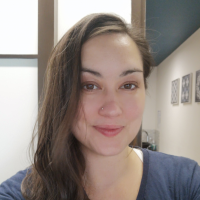A few months ago, while listening to Deepak Chopra read his audiobook Metahuman, I found myself shaking my head emphatically on the tube platform.
I couldn’t believe that someone so profoundly associated with mindfulness would be suggesting this idea when it came to pain.
“Pain is all in your mind,” he said. And went on to explain that with practice, you could all but remove physical pain from your life.
“No no no no no,” I muttered under my breath—quietly, I thought, until I noticed a nearby passenger look up from his phone. I couldn’t help it.
Pain isn’t all in our head or a sign of weakness for our minds to conquer. It’s how our bodies talk to us.
(“Pain” here is referring to all uncomfortable sensations, whether it’s a niggle, an ache, soreness, fatigue, or sharp pain, and not something resulting from a traumatic injury like a car accident.)
If we “master” that, we’re actively ignoring what our body is trying to tell us, only to be surprised when it breaks down or gives way.
(I do deeply respect Mr. Chopra, and enjoyed listening to the rest of the book. It was just this chapter that I felt needed a response as I’ve seen this concept be so damaging to people.)
Pain as the Enemy
This idea isn’t new, for sure.
All my life I’ve heard versions of “pain is weakness leaving the body,” “pain is all in your head,” “master your pain or it will master you,” “no pain, no gain.”
The more pain we feel, the weaker we are; the more we can push through or work past pain, the tougher we are.
It creates an idea of pain or our body as an enemy, and like so many things in our patriarchal society, if you’re not beating the other party, you’re the loser. This idea bleeds into almost every aspect of life.
Think about the work that’s rewarded in our society: all hours at the office, push through tiredness, hunger, stress, anything to get the job done. We’re so conditioned to ignore our bodies, that often a serious pain, ache, or discomfort is the first thing we notice. When, in fact, our body almost always starts with gentle nudges well before a serious issue—we just can’t hear it.
Pain, discomfort, soreness, achiness, tiredness are all signs that our body needs something.
Instead of thinking of pain as something to conquer, what if we started thinking of it as one of our best connections to our body?
Pain as a Messenger
After more than a decade of working with various manifestations of physical pain, in myself and others, I can say for sure: pain is not the enemy. It’s one of the many ways our body tries to communicate with us, and one of the few ways that gets through.
Our body doesn’t have words to talk to us, so it communicates with sensations.
Most of us are familiar with things like hunger or tiredness. There are also many more subtle clues like heaviness or smoothness in our movements, a vague discomfort or unease when we move in certain ways, a feeling of unease around certain activities or foods we can’t quite place.
These more subtle clues are usually the first to be forgotten when we’re avoiding or “mastering” our body.
Heaviness or discomfort graduates into a niggle, a tiredness. The tiredness or niggle becomes an ache or pain. This is just our body escalating.
It’s asking: Do you hear me now? Do you hear me now? How about now?
Each time we ignore those messages, “master” our pain, we’re telling our body to just deal with it, with no support from us.
Our body is incredibly resilient. It usually comes up with a workaround (turn your torso instead of your neck, bend forward to put your shirt on so you don’t have to lift your arm to where it hurts), and often without us even realising. That’s how we can one day just “sleep funny” and have a neck spasm, or bend over too quickly and throw our back.
It’s rare that these small movements have, out of nowhere, created a big problem.
It’s much more likely that months, years, and decades of small niggles, aches, and pains have been ignored, building up until, finally, our body can’t adjust for us anymore.
Pain as Our Bridge
Instead of thinking of pain as our enemy, or something to tough out, what if instead we thought of our pain, and other sensations we experience from our body, as our bridge—our connection to our body.
There’s so much more than a pain/no-pain binary.
Even without pain, tension, crunchiness, and heaviness can drain our energy. When we connect to and become aware of these other sensations, the lightness and freedom of movement can be life-altering.
Our body doesn’t want to be in pain. It isn’t “me versus my body.” It’s me and my body versus whatever may be trying to pull it out of balance, whether that’s posture at work, running mechanics, or even a chronic illness.
What if instead of ignoring and pushing down pain, we listened to it?
What if we developed a relationship with our body where we’d notice fleeting niggles as a call to action, a nudge to find out what’s going on?
Choosing to Listen Instead of Master
I’ve done both.
When I started my business, I pushed.
I pushed through two pregnancies and five years of learning how to run a business—working crazy hours and relying on caffeine to create enough energy to do all of it.
I pushed through anxiety and fatigue and multiple, multiple aches and pains.
I ignored my body and it learned to get on without my help—until it couldn’t. Then, there I was, the massage therapist who couldn’t stand straight because of lower back pain or couldn’t turn her head because of another neck spasm.
I even had a month of a mysterious foot/ankle condition that left me barely able to walk, waking me at 3 a.m. for weeks in pain. Subtle, right? Like my body was saying, what if we make it hard for you to walk, will you rest now? (I didn’t.)
I ignored it into anxiety and burnout and finally chronic sobbing (let’s just say I was stubborn in believing I could keep going no matter what).
Now, I listen.
I listen when I feel a little tired. I listen when I feel a little stiff.
I take time as I fall asleep each night, to connect to my body and see what feels stiff or tight.
I practice yoga to find the places I’m carrying tension that I haven’t yet noticed.
I get regular massages, partly because they feel good (a thank you, if you will, for my hardworking body) and partly because they can release muscle tension more quickly and effectively than my stretching ever does.
The next time you hear a message to push through pain, that pain is a mind game, that pain will go away, remember we can make a choice.
Do we agree with this idea of what pain is?
Or will we treat pain as a message from our body—an opportunity to connect to our physical selves in a deeper way, to learn how to work in a closer partnership with it?
~











Read 4 comments and reply